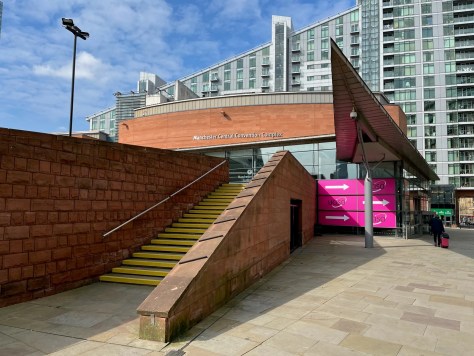
I have never attended the UCISA Leadership conference before, but after the 2020 conference was cancelled, I was given the chance to attend the 2022 event. This was the third in-person conference I have attended since March 2020.
This year’s much-anticipated UCISA22 Leadership Conference will look ahead at the future challenges and opportunities for digital leaders in education. The theme of conference is Digital Leadership in a Post-Pandemic World. Recognising our sector continues to operate in an unprecedented period of sustained change, the programme seeks to empower our leaders to not only navigate current turbulence, but overcome the challenges you face, such as cybersecurity, sustainability, and recruitment.
I wasn’t sure what to expect, but I kind of expected that this would be a highly technical conference, about how technology can deliver transformation and I can say that what I experienced was not what I was expecting.
The event was in Manchester and this was my first return visit to the city since a fleeting trip in September 2019. The conference was taking place at the Manchester Central conference centre.

I went to delegate registration and had the opportunity to grab a bag and a water bottle. It reminded me of the conferences I attended in the 2000s.
The conference kicked off with lunch in the Exhibition Hall. There was a wide range of exhibitors and lots of freebies as well.
The first proper session for me was the The power of IT – panel session
chaired by Laura Dawson, CIO, London School of Economics with two Vice-Chancellors: Andy Cook, Vice-Chancellor, Ravensbourne University and Professor Karen Stanton, Vice-Chancellor, Solent University.
Our opening session sees Laura Dawson , CIO at London Business School in conversation with Andy Cook, VC at Ravensbourne University and Karen Stanton, VC at Solent University. Laura will explore Andy and Karen’s career journeys, both having held CIO positions earlier in their careers, exploring what this experience brings to their role as Vice- Chancellor, the key skills digital leaders need in order to transform businesses and what it takes for a university to achieve digital transformation.

These two Vice-Chancellors who had previously been CIOs gave their insights into their journeys to leading their universities. I enjoyed the interview format which was engaging and interesting.
The importance of board experiences was discussed, especially the understanding of vision and strategy. Where senior management don’t really get strategy, then the organisation flounders around in the digital space and you rarely see transformation. I have recently read Good Strategy/Bad Strategy The Difference and Why it Matters and Richard Rumelt talks about how organisations often both fail to design and then deliver an effective strategy. There is much more to strategy than just being able to write a strategy.
The VCs also talked about how they needed to step away from technology and a CIO making that journey to VC (even the top table) was don’t focus on the tech. Interestingly it brought to the fore the importance of having a shared understanding of what digital transformation is.
The next session was Destination Digital. The ups and downs of UCL’s transformation journey with Andy Smith, CIO, University College London.

Who would join a university as CIO during a pandemic? Having joined UCL in May 2020 this has been the experience for Andy Smith and he lives to tell you the tale. Andy has set out to help this large and comprehensive university to harness modern digital methods and technologies to enable education, research, and to digitise how the university works. It has not all been smooth sailing and the transformation is far from complete. Andy will discuss the bumps along the road and what he has learned about trying to deliver transformational change in a university, including a shift to cloud and an ‘AGILE’ transformation. The drama has included a new Provost, the development of a new strategy for UCL, as well as all the challenges of university life, IT, and COVID that we share. Should that water really be coming through the floor of the datacentre?
Again much coverage about strategy and focusing on the end game, what outcomes do you want to have, what does it look like? There was recognition that transformation isn’t a linear journey, but is much more about looking holistically at the organisation.
Time also came up, however as with any discussion on time, it’s not about giving people more time, but recognising both what they will stop doing, and what they will then do with that time.
I had to leave the conference for a meeting in our Manchester office so missed the vendor session in the final time slot.
There was a conference dinner at the Albert Hall (the one in Manchester that use to be a Methodist Central hall, not that big place in London).

It was a nice dinner, and our team won the quiz.











